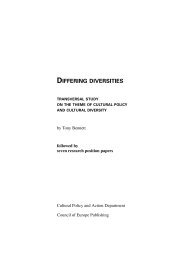Why we need European cultural policies: the impact of EU ...
Why we need European cultural policies: the impact of EU ...
Why we need European cultural policies: the impact of EU ...
Create successful ePaper yourself
Turn your PDF publications into a flip-book with our unique Google optimized e-Paper software.
I am focussing more on <strong>the</strong> technical aspects <strong>of</strong> <strong>the</strong> process as Suteu termed <strong>the</strong>m. It is importantto acknowledge, never<strong>the</strong>less, that any real assessment <strong>of</strong> results <strong>of</strong> <strong>the</strong> so-called technicalaspects <strong>of</strong> <strong>the</strong> accession will be evaluated mainly by scrutinizing what <strong>impact</strong> <strong>the</strong> enlargementmight have had, politically and in a broader <strong>cultural</strong> sense, not only on <strong>the</strong> member states – bothold and new – but also on <strong>cultural</strong> communication and cooperation with those <strong>European</strong> countriesthat remain outside <strong>the</strong> Union.The 2004 enlargement included eight post-socialist countries, whose economies and politicalsystems are in transition. Ano<strong>the</strong>r two countries <strong>of</strong> this kind – Bulgaria and Romania – are nowfinalizing negotiations and will soon become full members. Croatia <strong>of</strong>ficially became a candidatefor entry in 2004, and began negotiations for full membership in autumn 2005 at <strong>the</strong> same time asTurkey. This is a large number <strong>of</strong> countries that are simultaneously going through major reforms.It will be interesting in <strong>the</strong> future to compare <strong>the</strong>ir strategies and achievements and to evaluate <strong>the</strong>success <strong>of</strong> <strong>the</strong>ir reforms.Concerns about entryDespite <strong>the</strong>ir differences and individual features, all <strong>the</strong>se countries embarked on <strong>the</strong> roadtowards <strong>the</strong> <strong>EU</strong> with similar goals and expectations. Initially, most citizens looked at this processwith great enthusiasm. But, as <strong>the</strong> process continued, <strong>the</strong>y <strong>we</strong>ighed up what <strong>the</strong>y saw as <strong>the</strong>costs and benefits <strong>of</strong> integration; preliminary assessments and <strong>the</strong> concrete results began tochange people’s general attitudes.Mucica’s discussion <strong>of</strong> <strong>the</strong> <strong>impact</strong> and results <strong>of</strong> <strong>the</strong> enlargement asked:How can existing or future structures and <strong>policies</strong> best address <strong>the</strong> issues <strong>of</strong>enlargement towards <strong>the</strong> East, while retaining a pan-<strong>European</strong> perspective?How can enlargement promote and protect national <strong>cultural</strong> identities as <strong>we</strong>llas <strong>cultural</strong> diversity, whilst promoting a <strong>European</strong> identity? Does enlargement<strong>of</strong>fer broader access to diverse <strong>cultural</strong> products and <strong>cultural</strong> services, as <strong>we</strong>ll asmeans <strong>of</strong> production and distribution? Or will enlargement have ano<strong>the</strong>r form <strong>of</strong> ahomogenizing effect on <strong>the</strong> culture <strong>of</strong> <strong>European</strong> countries?(Mucica 2003)In <strong>the</strong> light <strong>of</strong> my earlier exploration <strong>of</strong> <strong>the</strong> lack <strong>of</strong> definition <strong>of</strong> culture and <strong>cultural</strong> policy, it isarguable that many <strong>of</strong> <strong>the</strong>se questions remain unans<strong>we</strong>red precisely as a result <strong>of</strong> that lack.As <strong>the</strong>re <strong>we</strong>re no targets or elaborated strategies, <strong>the</strong>re <strong>we</strong>re no benchmarks from which toevaluate <strong>the</strong> results. An overview <strong>of</strong> <strong>the</strong> negotiating position <strong>of</strong> <strong>the</strong> candidate countries presentedby <strong>the</strong> national teams before <strong>the</strong> beginning <strong>of</strong> negotiations included only technical aspects <strong>of</strong>harmonizing with <strong>the</strong> acquis communautaire and preparation for participation in communityprogrammes; <strong>the</strong>re was no reference to broader targets.While enlargement negotiations <strong>we</strong>re going on, debates about its <strong>cultural</strong> <strong>impact</strong> explored muchbroader topics and included discussions about national identity, <strong>the</strong> position <strong>of</strong> national culturesin <strong>the</strong> common <strong>European</strong> space, <strong>cultural</strong> cooperation within <strong>the</strong> <strong>EU</strong> and beyond, and o<strong>the</strong>r issues38Part 2 Cultural issues in <strong>the</strong> process <strong>of</strong> <strong>EU</strong> enlargement














